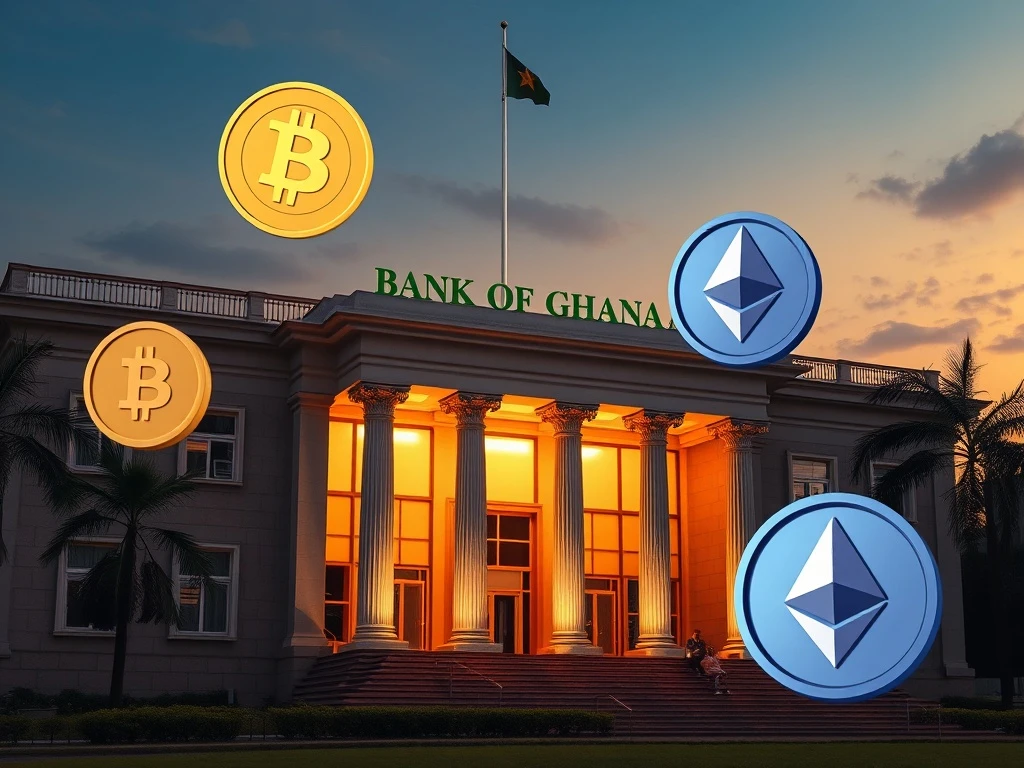Ghana Crypto Regulations: Pivotal December Deadline Approaches for Digital Assets

Ghana stands on the cusp of a significant transformation in its financial landscape. The nation’s central bank, the Bank of Ghana (BoG), is actively pursuing comprehensive Ghana crypto regulations, targeting a crucial December deadline. This strategic move aims to integrate digital assets into the formal economy, promising clarity and security for millions of users. The initiative reflects a growing recognition among African nations of the imperative to regulate the burgeoning cryptocurrency market, fostering innovation while mitigating risks.
Ghana Crypto Regulations: A Bold Step Towards Clarity
The Bank of Ghana is making substantial progress towards establishing a robust regulatory framework for cryptocurrencies. Johnson Asiama, the governor of the BoG, confirmed at the International Monetary Fund’s meetings in Washington that a bill is now advancing to parliament. This legislative effort marks a pivotal moment for the West African nation. The goal is clear: to have comprehensive regulations in place before the end of December.
Ghana’s proactive stance follows similar actions across the continent. Kenya, for instance, recently passed its own bill regulating the industry, setting a precedent. The BoG has dedicated considerable effort over the past four months to develop this regulatory environment. Asiama emphasized the extensive work involved in drafting the legislation, ensuring it addresses the unique aspects of the digital asset space.
Understanding Ghana’s Growing Crypto Adoption
The urgency for Ghana crypto regulations stems from widespread usage. Demandsage, an online data and statistics platform, estimates that over 3 million people in Ghana actively use crypto in some form. This figure represents approximately 8.9% of the country’s 34 million population. Such significant crypto adoption Ghana highlights the market’s organic growth and the public’s interest in digital currencies.
Initially, the Bank of Ghana adopted a cautious approach. It issued warnings, stating that cryptocurrencies were not legal tender. However, the undeniable rise in usage has prompted a shift in policy. Asiama acknowledged that policymakers could no longer ignore this trend. The goal now is to establish control, preventing abuse within the system while allowing innovation to flourish. This pragmatic shift demonstrates a commitment to adapting to modern financial realities.
The Regulatory Journey: From Drafts to Legislation
Ghana’s path to crypto regulation has seen several key milestones. Previously, the Bank of Ghana had set a September deadline for these regulations. While that deadline passed, the continuous effort remained strong. The bank also issued draft guidelines in August 2024, actively seeking public feedback. This consultative approach ensures that the final regulations are well-informed and comprehensive.
Johnson Asiama clarified that laws represent only the initial phase of the process. Effective monitoring of crypto flows remains paramount. Consequently, the BoG is investing heavily in developing necessary expertise and manpower. A new department is under formation specifically to manage these responsibilities. This strategic investment underscores the bank’s long-term commitment to overseeing the digital asset ecosystem.
Key Components of the Virtual Asset Service Providers (VASP) Framework
The upcoming legislation will likely mirror aspects of Kenya’s recently passed virtual asset service providers (VASP) bill. Such frameworks typically establish critical elements:
- Licensing Requirements: This ensures that exchanges, brokers, and wallet operators meet specific operational and financial standards.
- Consumer Protections: Measures are put in place to safeguard users’ funds and personal information.
- Regulatory Oversight: A clear framework guides the supervision of token issuers and other digital asset entities.
- Anti-Money Laundering (AML) & Counter-Terrorism Financing (CTF): These provisions are essential for preventing illicit financial activities within the crypto space.
By implementing these components, Ghana aims to create a secure and trustworthy environment. This framework will protect consumers and foster legitimate business operations. It will also align Ghana with international best practices in digital asset regulation.
Africa’s Digital Asset Landscape: Ghana’s Place
The push for Ghana crypto regulations is part of a broader trend across the continent. Isaac Simpson, senior head of financial advisory at Stanbic Bank Ghana, previously warned about the risks of inaction. He stated that the “digital train has left the station.” Many other African nations are already well ahead in this journey. These include Nigeria, Kenya, South Africa, and Rwanda.
These countries are actively piloting Central Bank Digital Currencies (CBDCs). They are also launching regulated crypto exchanges and issuing digital asset licenses. This proactive approach attracts global crypto capital and fosters innovation. Simpson emphasized that Ghana faces a clear choice: lead or risk being disrupted. Inaction carries significant costs:
- Loss of potential tax revenue from crypto transactions.
- Increased exposure to illicit capital flows due to an unregulated environment.
- Stifled innovation within the local tech and finance sectors.
- An unregulated, youth-led digital economy operating outside state control.
The Bank of Ghana recognizes these challenges. It aims to create an environment where digital assets Africa can thrive responsibly. This includes running a digital sandbox environment. This sandbox allows select companies to experiment with cryptocurrency solutions in a controlled setting. Such initiatives promote learning and innovation within a secure framework.
The Path Ahead for Ghana’s Digital Economy
Ghana’s commitment to regulating its cryptocurrency market signals a mature approach to financial innovation. The December deadline for Ghana crypto regulations is ambitious but achievable. Success will position Ghana as a forward-thinking nation in the global digital economy. It will attract investment and safeguard its citizens.
The establishment of a clear regulatory framework will bring numerous benefits. It will enhance investor confidence. It will also facilitate greater integration of digital assets into mainstream financial services. The Bank of Ghana is demonstrating leadership. It is adapting to the evolving landscape of global finance. This pivotal step will unlock new opportunities for economic growth and technological advancement in Ghana.







